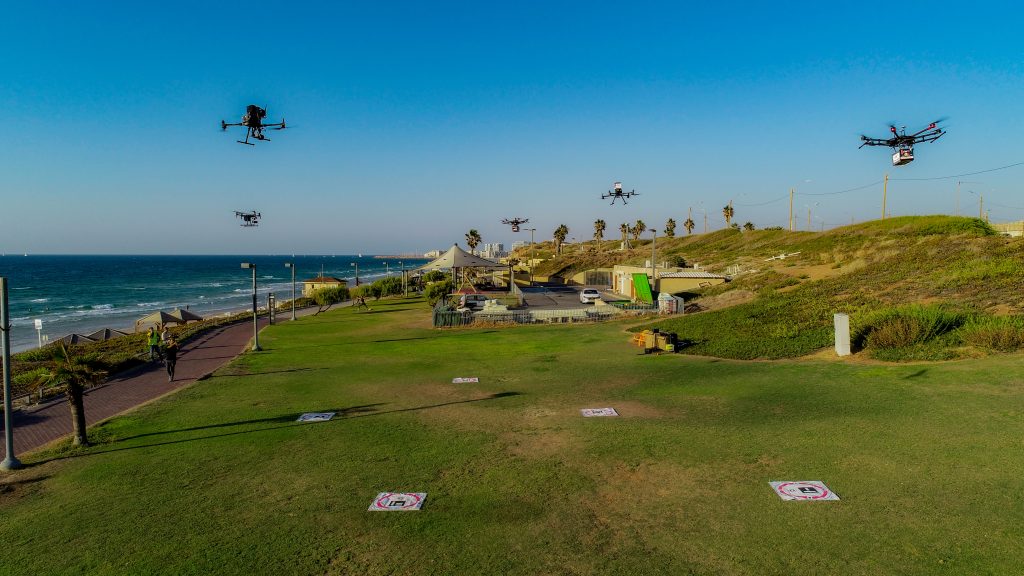In 2019, the Israel National Drone Initiative (INDI) was launched to promote the use of drones for the betterment of society. The initiative showcased the potential of Uncrewed aircraft Traffic Management (UTM) technology and served as an excellent example for other countries to follow. The partnership between the Israel Innovation Authority, C4IR Israel, Ayalon Highways, the Ministry of Transport, and the Civil Aviation Authority of Israel (CAAI) enabled the successful collaboration. This collaboration model can benefit other countries seeking to discover innovative solutions in the aviation industry.
The impact of drone technology on society and economy
INDI aims to seamlessly integrate drone and airspace management technologies, providing safe, fair, and economically feasible access to the airspace for all parties involved. To achieve this, the upcoming EU legislation (CAAI is an independent regulator, chose to adhere as practicable to existing EU or US regulations), known as U-Space1 as been adopted as the rules governing our regulatory sandbox. U-Space ensures that uncrewed aircraft traffic is managed by government-certified U-Space service providers (USSP). In a government-designated U-Space service area, multiple USSPs can offer their services, competing to attract customers. The competition’s goal is to reduce service fees and improve the quality of service.
INDI’s second goal is to make drone operations affordable for those considering early adoption. This would improve economic sustainability, create better products, and enhance citizen services. A new software system named the Multiple Drone Operating System (MDOS) has been developed to enable drone operators to perform multiple missions simultaneously, even with minimal staffing. In line with INDI’s philosophy of promoting healthy competition, three distinct MDOS products were created and showcased during the first call for participation period.
By leveraging drones’ versatility, INDI demonstrates how to positively impact diverse aspects of daily life, ranging from emergency response systems to cargo transportation and public services. INDI’s success story is further highlighted by its regulatory approvals for uncrewed flight routes in Israeli airspace, which have now become faster and easier to obtain. INDI conducted over 23,000 managed drone flights within its regulatory sandbox, providing a testing ground for various use cases and showcasing the potential of drone technology and its versatility, leaving an indelible mark on the industry.

The potential societal and economic impact of drone technologies is enormous. Specifically, healthcare is an area where drones can make a real difference. From emergency medical services to medical supply deliveries and aerial monitoring for public health initiatives, drones have demonstrated their tremendous potential to impact society positively.
INDI has collaborated with the Blood Bank to promote regulatory approval for drone-based blood product transport. Delivery routes between health institutes were demonstrated. INDI has conducted medical supply deliveries to significant hospitals including a critical drone interconnect between the two Hadassah medical campuses over metropolitan Jerusalem. Additionally, INDI provided overhead observation flights during emergency health event simulations.
The public sector, especially the healthcare industry, is expected to be an early adopter of this technology, given the significant positive social impact it can bring about. The INDI’s sandbox has enabled the exploration of innovative applications and highlighted the importance of integrating drones into critical sectors to address real-world challenges.
A Model Collaboration: Bridging Government and Industry
Israel’s success with INDI hinged on a pioneering collaboration between government bodies and industry stakeholders. This model showcases how effective partnerships can drive innovation and redefine industry standards. Setting up this collaboration involved establishing a cross-functional task force and transparent communication channels. A flexible regulatory framework prioritizing safety and compliance was crucial for success. Key learnings included fostering trust, flexibility, and adaptability with a commitment to advancing innovation responsibly. These insights can guide other nations in establishing similar partnerships to drive innovation and reshape industry standards.
Leading in UTM and Drone Technologies: Setting Global Standards
Israel is a global leader in Uncrewed aircraft Traffic Management (UTM in the US and U-Space in Europe) and drone technologies. The case study, therefore, becomes a repository of best practices, offering insights into how a nation can elevate its technological capabilities and position itself at the forefront of an industry. Israel’s commitment to pushing the boundaries of technological innovation becomes a guiding light for countries aspiring to achieve similar excellence in UTM and drone technologies.
One noteworthy achievement of Israel’s drone ecosystem is it has become one of the first countries to implement UTM systems, effectively monitoring and managing many drones operating in its airspace. This accomplishment signifies Israel’s commitment to safety, regulation, and technological innovation in uncrewed aerial vehicles, positioning Israel as a leader in uncrewed aircraft airspace management and setting an example for other nations aiming to implement comprehensive UTM solutions to integrate drones into the national airspace.
International Collaboration: Shaping a Global Ecosystem
National borders did not confine Israel’s INDI; it actively engaged in international collaboration, presenting a compelling case for creating a global ecosystem. Collaborations with leading national and regional aviation regulators & organizations, the US FAA, EASA, and Eurocontrol in Europe, Standard Development Organizations such as ASTM, C4IR & The World Economic Forum with the AVIATE: Advanced Air Mobility initiative, presentations at UN technology forums & visits by global leaders such as the Director General of the International Civil Aviation Organization (ICAO) underscore Israel’s commitment to being a technological and regulatory international hub. This global adoption of developing frameworks and outreach becomes a pivotal aspect of the case study, highlighting the importance of forging alliances to shape the future of airspace management collectively.
Israel’s National Drone Initiative emerges as a technological milestone and a living case study. It showcases the power of collaboration, integration & innovation in creating a global ecosystem that can redefine the future of uncrewed aircraft airspace. As nations look to harness the transformative potential of drone technology, Israel stands ready to offer its experiences and insights, inspiring a new era of technological progress that knows no bounds.
Co-Writers of this blog:
- Daniella Partem – Senior Director & Head of C4IR Israel, Israel Innovation Authority
- Ofer Lapid – Senior Expert Evaluator, Israel Innovation Authority
- Ami Weisz – Manager, R&D and Flight Testing Department, Civil Aviation Authority of Israel (CAAI)
- [i] The EU drone U-space law is called the “U-space Regulations.” It consists of three principal regulations:
Regulation (EU) 2021/664 establishes the common framework for providing U-space services.
Regulation (EU) 2021/665 lists the requirements for air traffic management/air navigation services providers and other air traffic management network functions in the U-space airspace designated in controlled airspace.
Regulation (EU) 2021/666 outlines the requirements for manned aviation operating in U-space airspace.
These regulations, enacted on January 26, 2023, are designed to safely integrate drones into European airspace. ↩︎

